Building the Fair
- Would the Fair be ready
to open on time?
A recap of construction progress on Labor Day, 1963, showed pavilions
in varying states of completion:
- Austria -- structure being
prefabricated in Austria.
- Hall of Science -- driving
piles.
- Sinclair -- 30% completed,
expected to be finished by October.
- Unisphere -- all continents
& orbital rings in place, completion expected in September.
- Federal Pavilion -- foundations
complete, steel frame topped off August 22nd.
- India -- Pile driving
completed.
- World of Food -- Piles
completed, working on foundations, structural steel work to start
September 2nd.
- The utility system for
the Fair involved 14 miles of water mains, 130 miles of high
voltage electrical cables, 22 miles of storm and sanitary piping
and 10 gas mains.
- The huge scale model in
the New York City Pavilion took over two years to build and cost
$600,000.
- No labor disagreements
adversely affected progress toward the opening day goal.
- Exhibitors and concessionaires
put $550 million into construction and exhibits.
- During July, 1963, 6,665
men worked at the Fair site and 2,332 worked on related arterial
[highway] improvements.
- The final steel beam was
put in place on the Travelers' "umbrella" dome on May
16, 1963.
- The Simmons Beautyrest
Pavilion was the first pavilion completed in the Industrial Area.
- 5,000 tons of steel went
into the construction of the Federal Pavilion. About 250,000
tons of steel went into the construction of various exhibit buildings.
- Before Formica could build
its "House on the Hill," it had to build the hill;
it used dirt excavated for other buildings that were constructed
on the flat Fairgrounds.
- The official "lighting
up" of the General Electric Progressland dome, a display
of multi-colored swirling lights, occurred on January 29, 1964.
That date also marked the arrival of Disney's "Carousel
of Progress" attraction at the pavilion.
- By Labor Day, 1963, man-hours
worked on the Fair totaled 12,936,660 with a payroll of $65,000,000.
- Fair pavilions were constructed
to withstand an Atlantic seaboard winter and exhibitors saved
little in construction costs.
- Of the thousands of trees
growing in Flushing Meadow before the Fair, 200, ranging up to
50-feet tall, had to be transplanted because of construction.
- No contractor hired a
"night shift" for pavilion construction.
- The Port Authority Heliport
was completed and officially opened to the public on October
16, 1963.
- The World's Fair Marina
was made by the dredging of some two million cubic yards of silt
from Flushing Bay.
- Two years of planning,
plus specially made cobblestones, went into the construction
of Rheingold's "Little Old New York."
- By the end of the summer
of 1963, an additional 15,000 workers were thought needed in
order to finish the Fair on time. Work was hastened in the last
quarter of 1963 and the additional manpower was not needed.
- The Gas Companies Pavilion
was the first to start building. Groundbreaking was in April,
1962, twenty-four months before opening day.
- The largest pavilions
constructed for the Fair were General Motors' and Ford's with
320,000 and 227,360 sq. feet of floor area.
- More than 3,500 bench
units were placed in street malls and park areas throughout the
Fairgrounds as construction neared an end.
- Besides Simmons, eleven
other pavilions were complete inside and out by January, 1964
- Century Grill, Dynamic Maturity, Eastman Kodak, First National
City Bank, Formica, the Heliport, Hall of Free Enterprise, International
Plaza, the Post Office, Sinclair and Mobil.
- The Fountains of the Planets,
installed in the Pool of Industry, were completed by December
7, 1963 when they were activated in a preview show to test the
water patterns, color, sound and fireworks displays.
- Most pavilion foundations
and roofs had an estimated "natural life" of five years.
|
-
Passing motorists on the Grand
Central Parkway watched in wonder as the Fair rose from the Meadow
day by day.
-
-
SOURCE: NY World's
Fair Progress Report No. 9
-
September 26,
1963
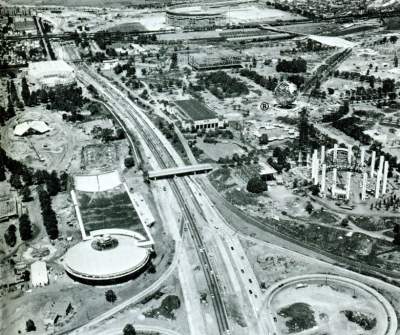 |
-
Early construction of Unisphere
shows a
-
skeleton of latitudes and longitudes.
-
-
SOURCE: FAIR
NEWS
-
July 22, 1963
|
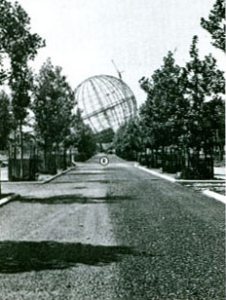
|
|
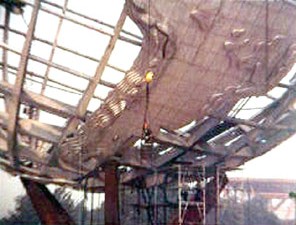
-
Unisphere nears completion.
|
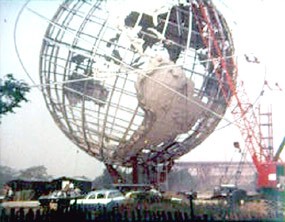
-
SOURCE: Bell
System Promotional Film "A Ballad for the Fair"
-
Presented Courtesy
Mitch Dakelman and Ray Dashner Collection (unless otherwise noted)
|
|
 Webmaster's note... Click
HERE to
read more about the design & construction of Unisphere!
Webmaster's note... Click
HERE to
read more about the design & construction of Unisphere! |
New York State Pavilion
|
|
-
By Labor Day, 1963, foundations
were complete and work was progressing on the exterior wall of
the theater, on tower concrete and steel compression ring was
being assembled on the ground within the tent's columns.
-
-
SOURCE: NY World's
Fair Progress Report No. 9
-
September 26,
1963
|
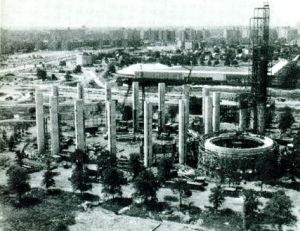
|
|
|
-
Nearing completion in the spring
of 1964.
-
-
SOURCE: online
auction
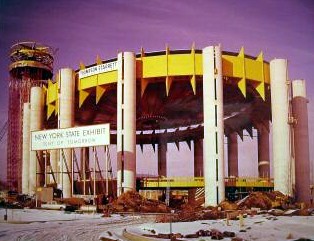 |
|
 Webmaster's note... Click
HERE to
read more about the design & construction of the New York
State Pavilion!
Webmaster's note... Click
HERE to
read more about the design & construction of the New York
State Pavilion! |
Federal Pavilion
-
Massive steel framework of the
Federal Pavilion. The structure was built to be a permanent part
of Flushing Meadow and more than 400 piles were driven to support
the building.
-
-
SOURCE: NY World's
Fair Progress Report No. 9
-
September 26,
1963
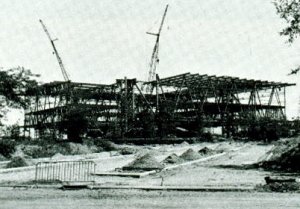 |
|
-
Federal Pavilion nears completion
in the spring of 1964
-
-
SOURCE: FAIR
NEWS
-
January 22, 1964
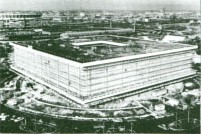 |
|
Gas Companies
-
Construction scaffolding makes
lacy curtains for the Gas Companies Pavilion.
-
-
SOURCE: NY World's
Fair Progress Report No. 9
-
September 26,
1963
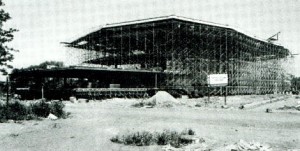 |
|
-
Gas, Inc. nears completion in
the autumn of 1963.
-
-
SOURCE: FAIR
NEWS
-
January 22, 1964
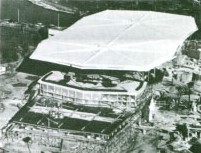 |
|
 Webmaster's note... Click
HERE to
read about the design & construction of the Gas Companies
Pavilion!
Webmaster's note... Click
HERE to
read about the design & construction of the Gas Companies
Pavilion! |
-
Early aerial view of construction
progress on the Industrial Area of the Fair..
-
-
SOURCE: NY World's
Fair Progress Report No. 8
-
April 22, 1963
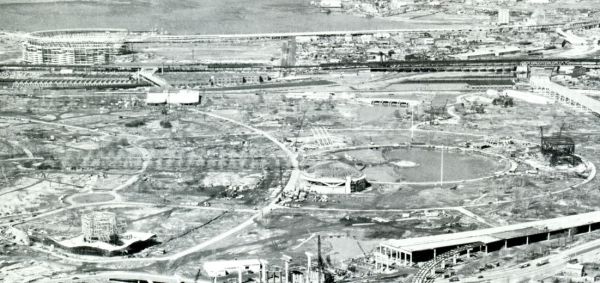 |
House of Good Taste - AMF Monorail
-
Traditional Home under construction
at the House of Good Taste exhibit.
-
-
SOURCE: NY World's
Fair Progress Report No. 9
-
September 26,
1963
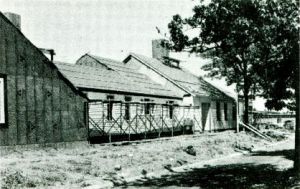 |
|
-
Open steel framework of the AMF
Monorail station shows tracks passing through the upper section
of the structure.
-
-
SOURCE: FAIR
NEWS
-
January 22, 1964
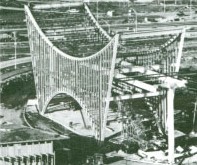 |
|
Austria - Vatican - Tower of Light
- Astral Fountain
-
Austrian Pavilion was prefabricated
in Austria and shipped to the Fair.
-
-
SOURCE: FAIR
NEWS
-
January 22, 1964
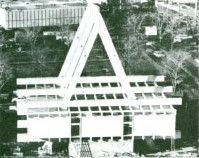 |
|
-
Vatican Pavilion under construction
in late 1963
-
-
SOURCE: FAIR
NEWS
-
January 22, 1964
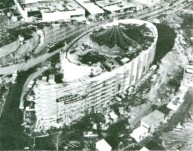 |
|
-
One of the more unusual construction
sites -- building the Tower of Light, 1963.
-
-
SOURCE: NY World's
Fair Progress Report No. 9
-
September 26,
1963
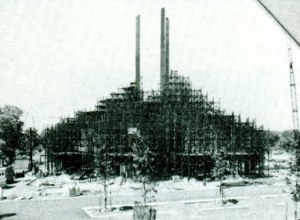 |
|
-
Scaffold surrounds the steel laticework
of the Astral Fountain.
-
-
SOURCE: NY World's
Fair Progress Report No. 9
-
September 26,
1963
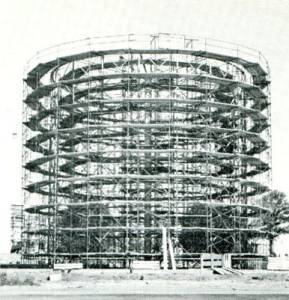 |
|
 Webmaster's note... Click
HERE to
read about the construction of the Tower of Light!
Webmaster's note... Click
HERE to
read about the construction of the Tower of Light! |
-
Crews working on day and night
shifts pave the huge complex of avenues. Most of the paving was
done at night when traffic on the grounds was at a minimum. All
curbing was laid in advance making the paving operation simple
and fast.
-
-
SOURCE: FAIR
NEWS
-
March 22, 1964
|
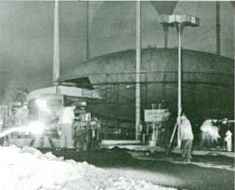
|
Rheingold - Pakistan
-
Construction of Rheingold's "Little
Old New York"
-
-
SOURCE: NY World's
Fair Progress Report No. 9
-
September 26,
1963
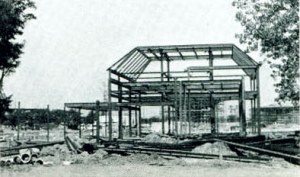 |
|
-
Pakistan's pavilion was enclosed
by September, 1963.
-
-
SOURCE: NY World's
Fair Progress Report No. 9
-
September 26,
1963
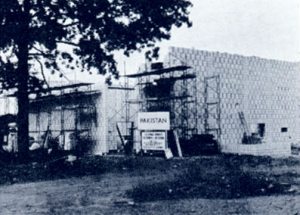 |
|
Builders of the Fair
- LABOR
- .....An army of almost 9,000
building and construction tradesmen are racing against time to
assure that the Fair and the approaches will open on April 22,
1964. They play the final part in the long task of creating reality
from an idea. The finished product, clean and polished, is labor's
contribution to a great Fair. Unnoticed, but of equal importance,
is the work on buried utilities and foundations, the hidden structural
frames and mechanical equipment that make an exhibit possible.
- .....More than 200 exhibits,
buildings and other structures are under way at the Fair. It
is an outstanding tribute to the building trades unions that
no labor disagreement has adversely affected progress toward
the opening day goal. The pledge of labor peace has been kept.
By June 30, 1963, when collective bargaining agreements of fifteen
of the construction trades were due to expire, most contracts
had been successfully renegotiated. The other trades continued
work without interruption until contracts were signed.
- .....Early in the fair history,
the Building and Construction Industry, both management and labor,
established machinery to which all disputes, actual or potential,
could be referred. Peter J. Brennan, president of the Building
and Construction Trades Council; Peter W. Eller and Walter M.
Colleran, chairman and secretary respectively, of the Building
and Construction Industry Advisory Committee, and leaders from
each union have cooperated to make it function effectively.
- .....During July 1963, 6,665
men worked at the Fair site and 2,332 worked on related arterial
improvements -- a total of 8,997. Since the start of the Fair
complex and as of July 31, 1963, man hours of work totaled 12,936,660
with a total payroll of over $65,000,000.
- .....With a little over six months to go,
there is every indication that labor relations, with one of the
greatest armies of workers ever assembled in a square mile site,
will continue to be excellent and that labor's previous record
of outstanding performance will be more than equaled.
- .....More than 30,000 will be employed by
the exhibitors and concessionaires at the Fair in maintenance,
service and entertainment. The same care and forethought is being
given to the problems of this even greater army. Means are being
set up for ready adjustments of disputes. Results will, no doubt,
come up to the record made during the construction period.
-
- SOURCE: NY World's Fair
Progress Report No. 9 September
26, 1963
|
-
Winter - early 1964. Would the
Fair be ready to open on time?
|
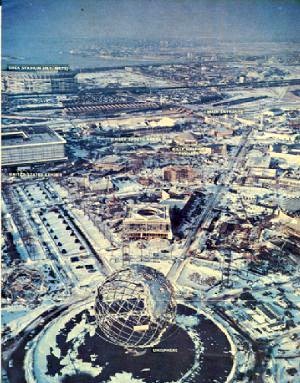
|
|
|